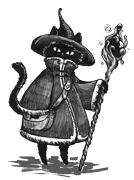|
That's not a bad point.
|
|
|
|

|
| # ? Apr 30, 2024 16:32 |
|
I dispute this idea of an even "arguably" good Honor Harrington book.
|
|
|
|
Arguably the Southern Reach books are a trilogy that end with a bunch of unresolved questions, but unfortunately those fail the "good" part of the equation.
|
|
|
|
Djeser posted:Arguably the Southern Reach books are a trilogy that end with a bunch of unresolved questions, but unfortunately those fail the "good" part of the equation. Annihilation is literally the worst book I have ever finished reading. It is unfathomably bad.
|
|
|
|
I'll tell you what, it doesn't get better in the next books!
|
|
|
|
I like Annihilation and Authority and I even like Acceptance the best
|
|
|
|
I liked Annihilation well enough (and the movie too), but god that 2nd book was awful. That paragraph doesn't even do it justice.
|
|
|
|
Authority is great once you realize that there is a ton of really important stuff happening right under the protagonist's nose and he's just not catching it. It's a book that trusts the reader a lot and that can be frustrating if you don't trust it too. Pay attention to the chapter titles!
|
|
|
|
It seems possible -- though I certainly don't know for sure -- that this might not be something you have to 100% solve perfectly on your own. You're going to get a lot of editor comments, and it would make sense if some of those were directed at the issue of resolving whether or not it's a standalone or not. But to make it possible, I think a solid approach is to have a complete story arc that solves a small problem that is part of a much bigger problem. It's the balance between those that's tricky, because you can't leave the reader feeling like the big problem is what should have been resolved. In the rest of the series, your protag gets more involved with (and becomes more capable of solving) the big problem. So, for example, in book one you save someone from a secret government facility. At the end, they are rescued, you've achieved your personal goal, hooray. Then by the end of the series you are leading the pirate army and destroying the entire government. Or you're a girl trying to get into a magic school that's always been for boys by passing all the crazy entrance tests. Book 1, you get into school, hooray. End of series, you're leading a pirate army that's destroying the entire magic government. Or you're an intern at a famous fashion magazine and your boss is a real bitch who treats you like trash. By the end of book 1, she treats you like a human being and you get a full time job. Hooray, I guess. But by the end of the series, you are leading a pirate army and destroying the entire fashion industry with your new pirate-themed couture line. Basically, if you end up leading a pirate army, you are good to go. Also for some reason you are the protagonist of all your own books.
|
|
|
|
The Definitive Writing List: Personally Protagonist Pirate Army Profit Got it.
|
|
|
|
General Battuta posted:Authority is great once you realize that there is a ton of really important stuff happening right under the protagonist's nose and he's just not catching it. It's a book that trusts the reader a lot and that can be frustrating if you don't trust it too. Pay attention to the chapter titles! ya that whole series is good whatever tho. what even is fiction
|
|
|
|
I admit 'protagonist is an idiot' is a tough sell for me. Unless it's funny. I got a second round rejection from Clarkesworld, continuing a maddening trend of close-but-not-that-close. I need to cure myself of overanalyzing magazine submissions and duotrope numbers and just write. I dream of an idyllic future where I have so many stories written that I transcend to a constant state of submittal and rejection and thus no individual matters anymore. The problem is I keep retiring old stories for not being as good as newer ones.
|
|
|
|
Is there a new Fiction Farm thread to post prose snippets of less than 1000 words? I've noticed the topic listed in the thread OP has been vaulted.
|
|
|
|
Ccs posted:Is there a new Fiction Farm thread to post prose snippets of less than 1000 words? I've noticed the topic listed in the thread OP has been vaulted. There is now! I think the 1000 word cap isn't helpful so I didn't include it. But otherwise it should work basically the same. I'm happy to take suggestions that will make the thread better/more useful!
|
|
|
|
I agree re ditching the 1000 word limit. In theory it was good for workshopping specific stuff but in practice it meant everyone posting a thousand words of fiction was starting their post with 600 words of preface explaining the setup.
|
|
|
|
It took a couple of weeks but I finally made it all the way through this thread. That OP is some amazing stuff! To contribute - I've seen Writing Excuses brought up a few times in the thread, but not Brandon Sanderson's main YouTube channel which contains all of his BYU lectures on writing SFF and some other miscellaneous questions on writing that he's been answering during his livestream signing sessions. This is the playlist for the 2020 lectures: https://www.youtube.com/playlist?list=PLSH_xM-KC3Zv-79sVZTTj-YA6IAqh8qeQ Most of what he covers applies to any genre (or any storytelling really), though there's a few that are very specific to SFF (e.g. world building and magic systems). He also has 2 lectures covering the business/publishing side of things (traditional and self publishing). Jerry B Jenkins also started up a YouTube channel and recently posted a pretty good video on writing dialogue: https://www.youtube.com/watch?v=jpWKp-fnZuU
|
|
|
|
Learning dialogue from the Left Behind guy is like learning neurosurgery from Walter Jackson Freeman II.
|
|
|
|
Read more, write more, close thread, I know, but when you're starting out, having someone break down a thing into its constituent parts is very helpful - especially for reading more and analyzing what someone else did and why I like or do not like it. His stuff doesn't sound like it'd be my cup of tea either, but the video itself gave me a helpful framework on how to think about writing dialogue. 
|
|
|
|
Sham bam bamina! posted:Learning dialogue from the Left Behind guy is like learning neurosurgery from Walter Jackson Freeman II. lol i distrust authors who post how-to videos when they could be writing more, reading more, closing threads
|
|
|
|
If you want some really good author advice Steering the Craft by Urusla K Le Guin is real good. I don't think it covers dialogue specifically, but I worked my way through it with a small group a little while back and I'm thinking of going through it again and redoing the exercises she recommends to give myself a refresher on the ideas. Even if you don't get a lot of useful advice out of it, you've just spent a couple of hours reading essays by Ursula K Le Guin, and that's satisfying in its own right.
|
|
|
|
take the moon posted:lol Sometimes explaining things to other people helps you better understand it yourself. It's like how you can learn a lot through critiquing someone else's work, and then steal all the good advice you gave them and use it for yourself!
|
|
|
|
take the moon posted:i distrust authors who post how-to videos when they could be writing more, reading more, closing threads Daric posted:Hello, I'm Brandon Sanderson. I just finished the final draft of my 450k word epic fantasy novel -- only the 4th of a 10 book series -- and between now and the time that it will release, I will write a novella set in the same universe that will come out a month before the book. I will then write 3 more books in the next year and a half before starting on the 5th novel. I also teach a creative writing class at BYU and have a weekly podcast where I claim each episode is only 15 minutes but in reality they're all about twice that. I don't sleep. I don't eat. I don't partake in earthly delights. I am the beginning and the end. Before me there was nothing. After me, the world will suffocate under the weight of my works.  Djeser posted:If you want some really good author advice Steering the Craft by Urusla K Le Guin is real good. I don't think it covers dialogue specifically, but I worked my way through it with a small group a little while back and I'm thinking of going through it again and redoing the exercises she recommends to give myself a refresher on the ideas. Currently waiting on a copy from my library!
|
|
|
|
2020: People actually read the OP?!?!Ccs posted:Is there a new Fiction Farm thread to post prose snippets of less than 1000 words? I've noticed the topic listed in the thread OP has been vaulted. Thank you for pointing this out, I have updated the OPs with the link to the new Fiction Farm Thread! Leng posted:It took a couple of weeks but I finally made it all the way through this thread. That OP is some amazing stuff! Thank you for the validation I desperately crave, I have added these resources to the OPs! I don't frantically F5 this thread as much as I used to, so if anyone ever has suggestions/corrections/additions* for the OPs, do not hesitate to PM me. If you don't have PMs available, just quote something incredibly intelligent that I've said, and I will notice and respond to you instead of scrolling by looking for the opportunity to make a dumb joke. You can also find me, and many other cool writing people on the thunderdome-branded but not thunderdome-exclusive SA writing discord: https://discord.gg/nzJy9MJ *like for example if for some reason you've been keeping a bunch of links to cool posts/resources in this thread.....
|
|
|
|
Novel writing month idea. A book about a non verbal boy and their GF/BF, presented as a notebook the two of them write in to talk to one another. Good Idea/Bad Idea? Are there any other books that do this in order to see how this would work? Im thinking the finished product doen't look like a book but like a random notebook you find on the ground.
|
|
|
|
BigRed0427 posted:Novel writing month idea. A book about a non verbal boy and their GF/BF, presented as a notebook the two of them write in to talk to one another. you're describing a form of epistolary novel (https://en.wikipedia.org/wiki/Epistolary_novel) I haven't read any, but that link has a list of some notable works from this century that might help you out
|
|
|
|
BigRed0427 posted:Novel writing month idea. A book about a non verbal boy and their GF/BF, presented as a notebook the two of them write in to talk to one another. Sounds like a solid concept for a YA epistolary! I would check out some examples of the genre, such as The Perks of Being a Wallflower, the Internet Girls series, etc. Also, unless you are non-verbal or selectively non-verbal yourself, I suggest you seek out some accounts from non-verbal people so you can portray the disability with sensitivity and care. Ideally you'd get a couple of paid sensitivity readers to look over your manuscript, but research can help you avoid some common pitfalls of privileged authors writing characters with marginalized traits.
|
|
|
|
good advice tbh. as a  disabled disabled person it sux to see what i deal with treated absurdly wrong in popular fiction & my favourite works are those that manage to display respect, empathy & dare i say show a beauty in the whole thing. not saying that you should strive for cliche & grandiose goals in yr writing but thats my perspective person it sux to see what i deal with treated absurdly wrong in popular fiction & my favourite works are those that manage to display respect, empathy & dare i say show a beauty in the whole thing. not saying that you should strive for cliche & grandiose goals in yr writing but thats my perspective*doesnt affect my functioning atm but it has been a beezy in the past
|
|
|
|
BigRed0427 posted:Novel writing month idea. A book about a non verbal boy and their GF/BF, presented as a notebook the two of them write in to talk to one another. They aren't nonverbal but the Griffin and Sabine books are a good example of how to do a modern epistolary and handles its themes of mental illness very well.
|
|
|
|
I hate this loving job
|
|
|
|
General Battuta posted:I hate this loving job Read... more ? 
|
|
|
|
I hate this job and I don't even have one!
|
|
|
|
This thread gave me excellent tense advice in the past and Google is failing me, so here's a dilemma I'm running into: When a story is in present tense but describing events that occurred in the past (and concluded in the past), how should those verbs be written? Example: quote:Perhaps here it should be mentioned that the windows cannot be opened, not at all, not even after she chipped away the paint. Is 'chipped' OK? Should it be 'had chipped'? If I was speaking out loud and announced "My windows don't open, even after I chipped away the paint." that seems fine, but I'm unsure in text. If the sentence was something like "She walks up to her window, which still refuses to open even after she [had] chipped away the paint." then I feel like the 'had' is necessary, but this is purely gut feel. Here's a similar example: quote:Her name is Stacey, though she often goes as Stace and for a stretch her dating profile listed her name as Thrace, that is until a pencil-dicked classical history PhD quizzed her on the global origins of such a name, which promptly led to the end of that. I feel like 'had' before listed, quizzed, and promptly led would be weird, but I also feel like it might be correct. Please help.
|
|
|
|
phone post attempt: my windows don't open even after i chip the paint away her windows didn't open, even after (though sounds better here) she'd chipped the paint away im no lexicologist (though technically a humanities specialist) but those sound ok e: the first sentence is irrelevant ig since youre dead set on a past tense thats just how i would say it irl. key is to stick to one tense i believe and not switch it up mid sentence so its like my windows didnt open even after i chipped the paint away e2: now im confused lol. no idea why my two second sentences seem tensed diff but they both sound fine (USER WAS PUT ON PROBATION FOR THIS POST) take the moon fucked around with this message at 17:21 on Oct 9, 2020 |
|
|
|
ultrachrist posted:This thread gave me excellent tense advice in the past and Google is failing me, so here's a dilemma I'm running into: When a story is in present tense but describing events that occurred in the past (and concluded in the past), how should those verbs be written? In this case, the simple past and the present perfect are roughly the same meaning. "It's fine, I took care of it" and "It's fine, I've taken care of it" both mean that you previously took care of it. The latter has more immediacy, as in 'I have finished taking care of it now.' It's more of an announcement than the former, which is just saying that at some point previously I took care of it. The past perfect is what you'd use if you were trying to say that, at some time in the past, you had already completed the action, like "It's fine, by the time he left I'd taken care care of it." So in your example, "not even after she chipped away the paint' is fine as would be "not even after she's chipped away the paint" with the mild implication in the second one that chipping away the paint is something she's just done, since it's emphasizing its present completion. To use "not even after she'd chipped away the paint" you'd need some time in the past that the action was completed by, like "not even after she'd chipped away the paint last Tuesday."
|
|
|
|
ultrachrist posted:Perhaps here it should be mentioned that the windows cannot be opened, not at all, not even after she chipped away the paint. For me there's nothing strictly wrong with this example but it isn't clear about when this is occuring, partially because I'm lacking context. The narrative voice is pulling me aside to tell me something, but I don't know if there's some kind of frame narrative/if the narrative voice is talking to me from the present. Thinking through it, assuming that these kinds of asides are usually in the present tense, the windows not being openable is basically stative so the tense there isn't an issue, but it's not clear if you're telling me: A) The windows aren't openable. She just chipped the paint away, but it didn't help. B) The windows aren't openable, even though some time in the past she had chipped all of the paint off of them. You could remove the ambiguity by either making it explicit that this isn't occurring now-ish (in whatever fashion you desire, just an example): No One posted:Perhaps here it should be mentioned that the windows cannot be opened, not at all, [even though she had once spent an afternoon chipping] away the paint. You could also remove the action entirely so this isn't an issue: No One posted:Perhaps here it should be mentioned that the windows cannot be opened, not at all, [even after all of their paint had chipped away]. ultrachrist posted:Her name is Stacey, though she often goes as Stace and for a stretch her dating profile listed her name as Thrace, that is until a pencil-dicked classical history PhD quizzed her on the global origins of such a name, which promptly led to the end of that. This one doesn't really have the same ambiguity problem because of "for a stretch" and the causal link between that stretch ending and the PhD being a dick. I do find it a little muddy to parse but I think that's partially because of how many clauses there are and partially because "which promptly led to the end of that" is a little weird when you've already prefaced the explanation with "until". I find this less confusing: No One posted:Her name is Stacey, though she often goes as Stace. For a stretch her dating profile [had] listed her name as Thrace until a pencil-dicked classical history PhD quizzed her on the global origins of such a name. Or this: No One posted:Her name is Stacey, though she often goes as Stace and for a stretch her dating profile listed her name as Thrace until a pencil-dicked classical history PhD [quizzing] her on the global origins of such a name [put an end to] that. Wallet fucked around with this message at 17:51 on Oct 9, 2020 |
|
|
|
Thanks for the responses. That's very helpful. Prior to the first sentence, there's context that would make it clear she didn't just chip away the paint since it's not the first window problem mentioned and the reader knows she's been dealing with this for a while. If I were to write this as a rule, it would go like this: When writing in the present tense and referring to the past, it is fine to use the past tense but it must be clear roughly how long ago the verb happened (a minute ago, yesterday, in ancient times, etc.)
|
|
|
|
I don't think you need to always be explicit about when things are happening, as long as you know what each tense implies about the order of events. You just don't want to accidentally muddle your meaning by saying one thing but accidentally implying another. It's more of a 'know your tools' thing than a 'this is how you have to use your tools' thing, imo.
|
|
|
|
Leng posted:It took a couple of weeks but I finally made it all the way through this thread. That OP is some amazing stuff! Great, Sanderson's first video said some of the hardest jobs to have while trying to write are programmer and teacher, and I do both. Just getting my feet wet in the writing realm and these Sanderson videos (and the OP) have already helped me improve!
|
|
|
|
General Battuta posted:I hate this loving job Glad to know it never gets better! (But also encouraging vibes, you can do this, keep going, imposter syndrome is real, you aren't an imposter, anyone in your way is being completely unreasonable, and you are 100% correct)
|
|
|
|

|
| # ? Apr 30, 2024 16:32 |
|
Does anyone have good sources for low cost editing? I'm finishing up the first in a series of fiction novels, and I've been seeing costs around 800-1100 usd and up for a 100k word manuscript. My intent is to use the first manuscript, and begin the long and painful search for an agent as I continue the series. So, if that's what it really costs then so be it. Also, would it be prudent to search for a genre-oriented editor? I'm writing to market in the cozy mystery genre, and I'm assuming that it might be possible to shop for an editor that way if it would help.
|
|
|


























